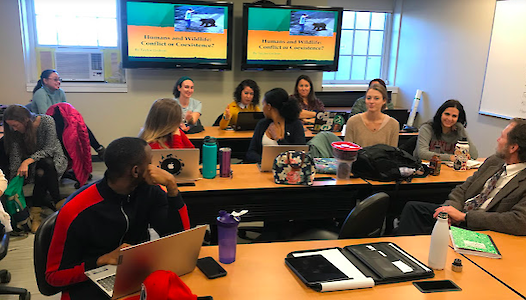Marine Estuarine Environmental Science graduate program
 Marine Estuarine Environmental Sciences (MEES) is an inter-institutional graduate program of the University System of Maryland whose mission is to educate students to become the scientific leaders and problem-solvers of the future. Using an interdisciplinary approach, MEES trains students to engage in scientific discovery, integration, and application to generate new knowledge and to solve environmental problems.
Marine Estuarine Environmental Sciences (MEES) is an inter-institutional graduate program of the University System of Maryland whose mission is to educate students to become the scientific leaders and problem-solvers of the future. Using an interdisciplinary approach, MEES trains students to engage in scientific discovery, integration, and application to generate new knowledge and to solve environmental problems.
IAN has a key role in the MEES program by a) co-leading the Environment and Society foundation and co-teaching the foundation course, b) teaching a professional development course in Science Visualization, and c) regularly leading Issue Study Groups, described below.
Environment & Society
Members of the IAN team co-teach the Environment & Society foundation course with social science faculty from the University of Maryland College Park each fall semester. This 3 credit graduate course (Environment & Society; MEES 620) combines social and natural science and features a diversity of guest lecturers from different disciplines.
Science Visualization
IAN Science Communicators teach a 2 credit professional development course in Science Visualization spring semesters, even years. This is a hands-on, skills-based course in which students generate a portfolio of science communication products including the following: conceptual diagrams, data visualizations, photographs, videos, maps, and websites.
Science for Environmental Management
Effective environmental management, based on sound scientific research, is crucial for responsible stewardship of our natural resources. IAN staff have partnered with UMCES senior leadership to deliver a course that provides a comprehensive overview of socio-environmental management. Representatives from various Chesapeake organizations and state agencies participate in the course.
Issue Study Groups
IAN staff have co-taught a series of Issue Study Groups including a) Developing a report card for the Upper Potomac River, b) Ecological forecasting and the science of hypoxia in Chesapeake Bay, c) Transdisciplinary science for environmental problem solving, and d) Developing an environmental justice index for the Chesapeake watershed report card.
About the MEES Program
The MEES Program is an inter-institutional, statewide graduate program within the University System of Maryland (USM). The program is composed of faculty from several of the USM's degree-granting universities and research institutions as well as experts from government, non-government agencies and other non-academic units. Thus, the MEES program affords students an unparalleled opportunity to combine the expertise of the best environmental scientists in the region to guide their program of study. Although the title of the program emphasizes its strengths in marine and estuarine sciences, the program itself spans the environmental sciences as a whole, irrespective of habitat. While the interests of students in the program are diverse, they generally center on some aspect of the interaction between biological, physical and/or chemical systems in the environment. Student research ranges from studies of molecular mechanisms to fisheries ecology, chemical pollutants, or economic assessments of environmental impacts. Since its faculty members come from so many sources, MEES provides a unique and valuable graduate education across the broad range of the environmental sciences.
The MEES curriculum provides a balance of disciplinary strength and interdisciplinary perspective, designed for environmental issues in the 21st century. The MEES Curriculum is designed around four interdisciplinary Foundational Areas: 1) Environment and Society, 2) Earth and Ocean Sciences, 3) Ecological Systems, and 4) Environmental Molecular Science and Technology. Students begin their academic training by taking the appropriate introductory Foundation course. Then, with the guidance of their advisory committee, students select additional elective courses that are specific to the student's interests. These courses may remain within their chosen Foundation or incorporate elements of other Foundations. There are numerous elective courses that can be taken to meet each student's diverse interests and study focus. Students also take several professional development courses and participate in Issue Study Groups.

